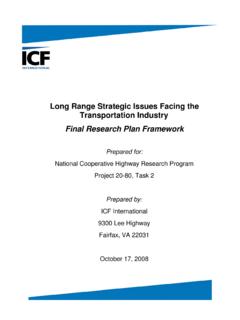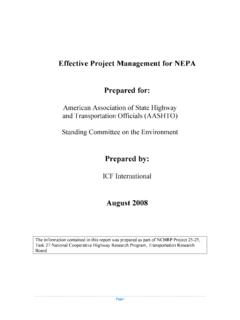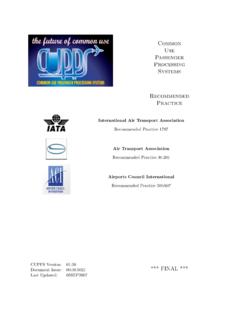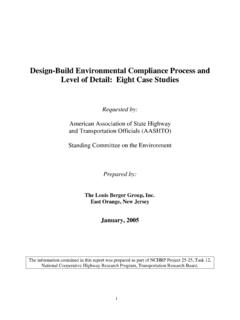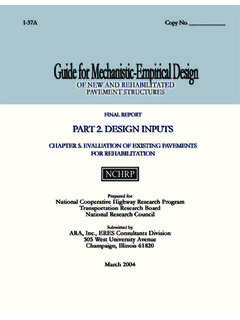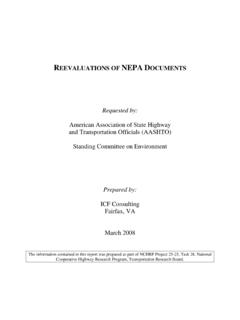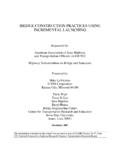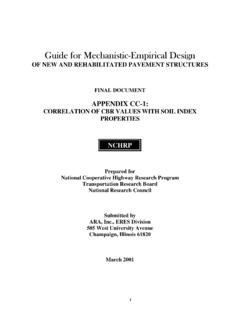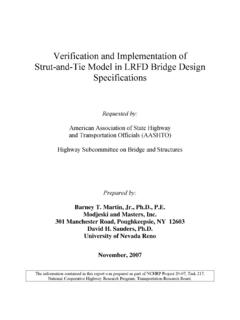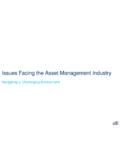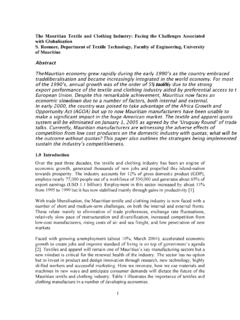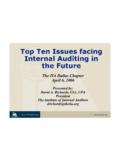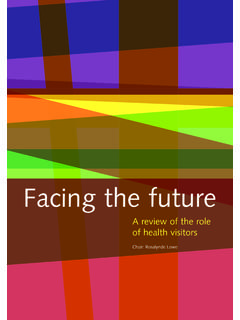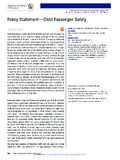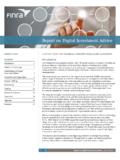Transcription of Long Range Strategic Issues Facing the ... - trb.org
1 Long Range Strategic Issues Facing the Transportation Industry Final Research Plan Framework Prepared for: National Cooperative Highway Research Program Project 20-80, Task 2 Prepared by: ICF International 9300 Lee Highway Fairfax, VA 22031 October 17, 2008 NCHRP 20-80 (2) ICF International Long Range Strategic Issues Facing the Transportation Industry Final Future-focused Research Framework October 17, 2008 1 ABSTRACT The transportation industry will face new and emerging challenges in the future, which may dramatically reshape transportation priorities and needs. During a three-month, intensive process, ICF conducted a literature scan and workshop with transportation experts to examine the major trends shaping the future and their interrelationships with transportation. These activities resulted in a framework for a new research program that will address long- Range Strategic Issues Facing the transportation industry.
2 The goal of the framework is to anticipate the future Issues that may be approaching so that transportation agencies are better prepared to respond to new and emerging challenges; and to explore visions of what the future should look like, so that transportation agencies can help shape the future through their decision-making. The report first identifies future Issues and trends, based on a literature scan of work conducted by futurists, demographers, economists, and other experts. The report then outlines a set of research focus areas, problem statements, and possible projects or tasks, building off the future Issues and trends and a discussion by a distinguished panel of transportation experts who were convened to address these Issues . The five research areas are: 1) travel demand behavior, 2) advanced transportation system operation and performance, 3) sustainable transportation, 4) transportation finance, and 5) delivery of transportation services.
3 NCHRP 20-80 (2) ICF International Long Range Strategic Issues Facing the Transportation Industry Draft Future-focused Research Framework October 17, 2008 2 TABLE OF CONTENTS 1. Introduction .. 3 2. Anticipated Trends and Forces Affecting 5 3. Research 11 4. Next Steps .. 34 5. Appendix: Participants at Workshop held August 19-20, 2008 .. 35 NCHRP 20-80 (2) ICF International Long Range Strategic Issues Facing the Transportation Industry Draft Future-focused Research Framework October 17, 2008 3 1. INTRODUCTION The transportation industry will face new and emerging challenges in the future, which may dramatically reshape transportation priorities and needs. The American Association of State Highway and Transportation Officials (AASHTO) Standing Committee on Research (SCOR) recognizes that research can help ensure that transportation practitioners are equipped to deal with future challenges Facing the industry over the next 30 to 40 years.
4 These challenges may derive from the impacts of major global trends, such as climate change, changes in the cost of fuels, and new technology, and from domestic trends, such as changing demographics and lifestyle expectations, changes in land use patterns, and limitations in current transportation finance methods. To support this effort, SCOR intends to allocate research funding to examine longer-term Strategic Issues , both global and domestic, that will likely affect Departments of Transportation (DOTs). This document presents a framework for a new research program that will address long- Range Strategic Issues Facing the transportation industry. It first identifies future Issues and trends, which may create new challenges for the transportation industry, based on a literature scan of work conducted by futurists, demographers, economists, and other experts. The report identifies a set of research focus areas, problem statements, and possible projects or tasks, building off the future Issues and trends and a discussion by a distinguished panel of transportation experts who were convened to address these Issues .
5 Process for Developing Draft Research Framework This document was developed in a three-month, intensive process, in which ICF conducted a literature scan and conducted a workshop on August 19-20, 2008, with transportation experts to examine the major trends shaping our future and their interrelationships with transportation. Specific steps in this process are noted below: 1. Research Scan ICF conducted a literature scan to identify major trends that may affect surface transportation in the future. The resulting briefing identified major thematic areas of inquiry and a structure for considering research needs, and served as a read ahead for discussions that took place at the 2. On-line Survey ICF created an on-line survey of the invited workshop participants to gather preliminary thoughts on the major trends and Issues of importance to transportation in the future. 3. Workshop NCHRP hosted and ICF facilitated a workshop with transportation experts in Arlington, Virginia on August 19-20, 2008 to serve as a primary basis for developing the draft research framework, gain agreement on major thematic areas of inquiry; and develop initial draft problem statements and possible projects (See Appendix for a list of participants).
6 ICF devoted substantial time to 1 Available upon request NCHRP 20-80 (2) ICF International Long Range Strategic Issues Facing the Transportation Industry Draft Future-focused Research Framework October 17, 2008 4 facilitated discussion sessions addressing the key themes identified from the literature review and draft research framework. 4. Refining Research Framework Following the workshop, ICF developed workshop proceedings, and used the results to refine the research framework. This effort involved an analysis of crosscutting research Issues that span the trend areas discussed at the workshop. Goals for the National Cooperative Highway Research Program (NCHRP) Future-Oriented Research Program The research framework presented in this document will serve as a basis for soliciting, identifying, and selecting research projects for funding by SCOR each year.
7 Fundamentally, the research program will fund projects focused on a longer timeframe (30 to 40 years) than are typically examined in more traditional research programs. Although some of the future challenges Facing the transportation industry are emerging today, the goal of this research program is to think outside of the current mind-set and look beyond the Issues currently Facing the transportation industry. In developing the framework for the research program, it is therefore useful to consider the following two goals: 1) To anticipate the future Issues that may be approaching so that transportation agencies are better prepared to respond to new and emerging challenges; and 2) To explore visions of what the future should look like, so that transportation agencies can help shape the future through their decision-making. If you cannot accurately predict the future then you must flexibly be prepared to deal with various possible futures.
8 --Edward de Bono, Serious Creativity NCHRP 20-80 (2) ICF International Long Range Strategic Issues Facing the Transportation Industry Draft Future-focused Research Framework October 17, 2008 5 2. ANTICIPATED TRENDS AND FORCES AFFECTING TRANSPORTATION The future is difficult, if not impossible, to predict. The level of uncertainty about the future also increases with a longer timeframe; what may be more likely in a year may change dramatically within 10 years, much less 40 years. Although this research program does not set out to predict the future, it is important in developing a framework for future-oriented research to assess potential changes that could have significant effects on society, and transportation Issues in particular. This section identifies several of the key domestic and global trends (external forces) that experts believe are likely to shape the future. Anticipated Future Trends and Issues Based on a scan of relevant literature on emerging domestic and global trends, and input from the expert panel, a wide Range of factors and trends were identified that may have important implications on transportation in the future.
9 The major trends are organized into five categories of forces, as shown in Figure 1. Each of these forces is described briefly below. If one goes back 40 years and looked at the world of 1968, one would find large differences in the Issues Facing society and the focus of transportation policy. Could we have anticipated the vast changes in demographics, development patterns, technology, the economy, and world stability over this period? Moreover, would we have made different choices concerning transportation? NCHRP 20-80 (2) ICF International Long Range Strategic Issues Facing the Transportation Industry Draft Future-focused Research Framework October 17, 2008 6 FIGURE 1: Key Forces and Trends Influencing Transportation2 Demographics and Societal Factors The profile of America is expected to change substantially over the coming 40 years. According to the Census Bureau, the population is projected to increase to 438 million by 2050, more than a 40% increase from the 2008 population of 304 million.
10 This population will be more ethnically diverse; over 80% of the projected population increase is attributed to immigrants and their descendents. The population will also be substantially older; it is estimated that more than 20% of the population will be 65 years or older by 2050, compared to The sizeable increase in population will create the need for more housing, employment, and services, which may lead to substantial impacts on travel patterns and demands. It is estimated that majority of the population will live in mega-regions, with more than 80% of the population in urban/metro areas, including Baby boomers are expected to choose a soft retirement and continue to work part-time beyond retirement Young people coming out of full-time education may increasingly choose to enter what they consider temporary, short-term jobs, which they use to finance international travel, volunteering in non-profit or arts-related careers, and/or continued education.
